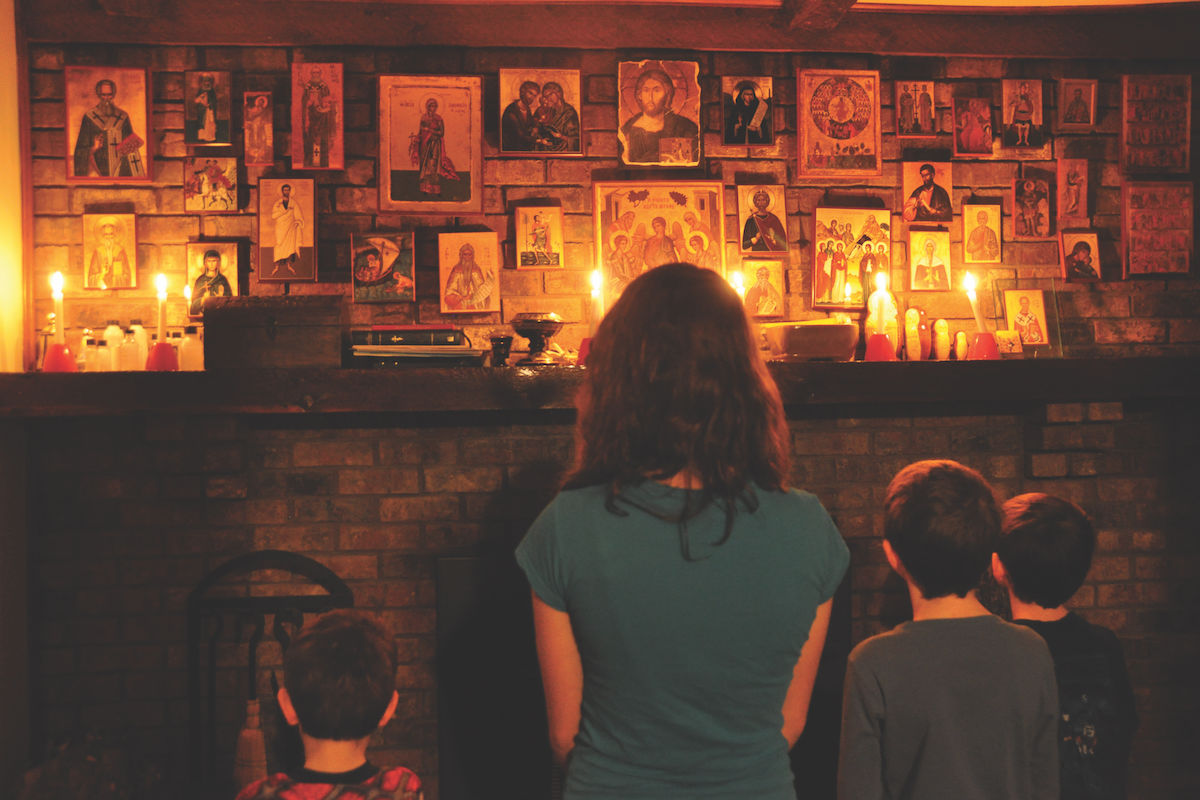The name of our child is important because it goes with him/her throughout his/her life. Traditionally, Christian parents choose names to express continuity with their family, "recycling" the names of parents, grandparents or other relatives. We all laughed during the scene in “My Big, Fat Greek Wedding” when Mr. Portokalis introduces his daughter’s future in-laws to the family – “This is my Brother… and his son Nick, … and his son Nick, … and his son Nick … and his daughter Nikki” - because we have experienced it.
Named in Christ
Christians have long chosen the names of Saints to proclaim their link with their spiritual family, the Church. The name may be of a Saint commemorated on or near to the day of the child's birth, or for whom the family has a special devotion. Likewise, an adult received into the Orthodox Church chooses a Saint's name to whom he/she has a strong attachment. In days past, this was often a costly witness for believers living in a non-Christian society, as their very names (Nicholas or George, Elias or Barbara) labeled them as Christians.
Each day of the year, the Church honors a number of Saints. The day the Church honors one’s Saint is one's "Name Day," an occasion to honor the memory of the Saint whose name we bear, and to give thanks for his/her daily intercession on our behalf. Individuals whose names are not found on the Calendar of Saints celebrate on All Saints Day, the Sunday after Pentecost.
We are to pray and have a special devotion to our Patron Saint. His or her life should be read and studied so that we learn how our lives should be directed. Our Patron Saint becomes a true hero/heroine for us to emulate.
Celebrating Name Days
Orthodox Christians practice a number of popular customs on their Name days. The most important way is attending the Divine Liturgy. If this is not possible, then s/he would attend on the nearest Sunday. The celebrant would want to prepare to receive the Eucharist. The persons named after the Saint could offer an Artoclasia, the five loaves of sweet bread, for their good health and that of their families. The bread would be shared with the other worshippers. On a Sunday celebration, they could provide cake or sweets during Fellowship Hour.
Traditionally, Orthodox Christians celebrate their name day by inviting family and friends to their home. Since this day is to focus on the Saint, his/her icon is prominently displayed. Whoever comes to visit wishes "Happy Name Day" to the celebrant. Favors or token gifts can be part of the day, but with a significant difference, the person celebrating the Name Day is the giver of gifts rather than the receiver. Giving is the best sign of gratitude for Christians. I remember one such day while a student at Holy Cross School of Theology. It was the feast of St. Maximos the Confessor, January 21, Metropolitan Maximos', then Fr. Max's, Name Day. During Dogmatics class, a classmate, Fr. Steven Callos wished Fr. Max a happy Name Day, and half-jokingly asked he if he was going to "treat" us for his Name Day. To our surprise, he said yes. That evening we traveled to his brother's home for coffee and sweets!
In the family much can be done to initiate children into this custom of celebrating Name Day. During the early years, the child will simply delight in being the center of attention yet again. Bringing out the Saint's icon, placing it in a central location and adorning it with flowers shows our devotion to the Saint.
Soon, however, children begin to ask questions about death and heaven. Having a relationship with those who have died in Christ (the Saints) can help to conquer the child's natural fear of death. Later the idea of children giving gifts or favors on their Name Days would be another weapon in the parents' arsenal against possessiveness and materialism, cravings that affect every child.
In the home, icons of the Patron Saints of family members are to be part of the Family Icon Corner or in the Bedrooms of the individual family members. On the Name Day, these icons could be placed in a special setting surrounded by candles and flowers. The family could go to church for the Liturgy or arrange for a special service preceding a festive gathering in the home. The life of the Saint could be read or related at mealtime, the Troparion of the Patron Saint read or sung, and special treats served. Inventive families have planned skits, made mini- Pilgrimages to local churches named for the Saint, followed by a trip to the child's favorite restaurant, or created banners and other home decorations about the Patron. The child can help prepare the liturgical or party foods, make or pick out favors to give to friends or relatives, or otherwise help with the day's preparations. Church tradition offers a positive reason for our children to be "someone special for the day" and children react favorably.
The Church is one Body in Christ: one household of all the baptized living or dead with Christ as its Head. Maintaining and celebrating our association with one of the Saints of Christian history helps us to see the Church, not as an impersonal institution but as it is meant to be: one family under the Lordship of Christ.
